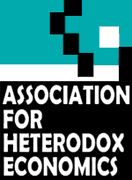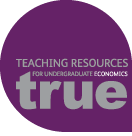Welcome to Heterodox Economics education! Our aims are:
- To encourage and support pluralism in the teaching and learning of economics in UK universities.
- To encourage and support the teaching and learning of heterodox economics in UK universities.
- To create a community of pluralist economics teachers willing to share ideas, resources and expertise in economics teaching.
- To promote alternative economic paradigms to potential students.
"Pluralism in the Economics Curriculum", by Andrew Mearman, University of Leeds, Published April 2017
Exploring Economics is a site run by the (German) Network for Pluralist Economics with introductory material on heterdox economics and pointers to many heterodox courses.
Resources
Heterodox Economics Education was led by Dr Andy Denis, Senior Lecturer in Political Economy at City University London.
This page, and the pages linked from it via the navigation bar on the left, are part of the TRUE project, aiming to make teaching resources in economics freely available online.
If you teach a module with any heterodox or pluralistic content, please contribute your teaching materials - syllabus, reading list, lecture notes and PowerPoints, handouts and exam papers, etc. If you teach degree-level economics and want to share your teaching materials, please get in touch with the Economics Network.
For the other 13 specialist areas, the emphasis is on second and third year options, as it was felt by project leaders that core micro, macro and quants at all levels are relatively well provided for by textbooks and open content through the web, but there was much less open availability of resources in specialist areas. This, however, does not apply to heterodox and pluralistic teaching, where there is a need for resources in core and first year modules quite as much as in optional modules taken in the second and third years of the undergraduate programme.
Intellectual property
Intellectual property of contributed material will remain with its present owners. You are encouraged to license the materials you contribute as Creative Commons – specifically, we would like to make use of the Creative Commons/ Attribution/ Non-commercial licence. Please refer to the Economics Network advice sheet for content authors on why and how to license their materials.



